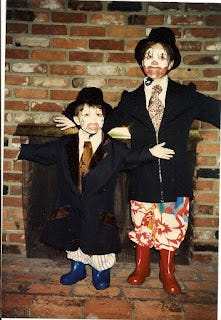explanation of composer FAIL #21 part 2

I think I may have calmed down a bit from this particular composer FAIL that now I may write about it. (Or, maybe I finally have the time to constructively write about it and share it with my tens of readers.)
To recap, the main reason why this grant was rejected was because the committee didn't believe I had hard evidence of how I would complete my "double-helix" concept in my future opera. (Did I have hard evidence of this? No, but that's because I would like to have funding discovering this double-helix concept. Spending time to work on this would be a little more beneficial than...working McMicken Ave.)
There are other reasons.
One musicologist committee member was a little concerned about the genre of opera I was going to write. This person proclaimed that comic opera is such a genre - Mozart, Donizetti, and Rossini all wrote amazing comic operas. Am I competent for the challenge? How does the committee know it's going to be a success? How do they know it will be funny?
[?!]
Um...how exactly do you judge success? Are all projects or research papers successful? What if you don't find what you're looking for? And how do you know this until you try?
To defend the thesis committee, there are those who argued this in my favor. Again, how do you pursue research or create new comic opera unless you let them try?
This person replied - yes, composers should try, especially if it's their first attempt (side note: this is not my first attempt), but this does not mean they should fund my attempt.
Do you want to know what my initial reaction to this statement was?
*It's not even your own money!*
That's right - the University of Cincinnati already reserved the money to fund summer research projects. This money does not come directly from the music professors.
And on this note, Michael Kaiser noted in the Huffington Post that this is the reason why the arts are dying in this country:
"Have we created and documented all we need of art? I don't think so. Is the world short on talent? No, again.
But the institutional nature of our arts ecology, a relatively recent phenomenon, means that groups of people are now more responsible for arts making than the individual. Boards, managers and producing consortia are overly-involved.
And these groups are misbehaving. They are overly-conservative, subject to "group think" and so worried about budgets that they forget that bad art hurts budgets far more than risk-taking does." (underlining added for emphasis)
I know many of my friends had issues with this article (calling Mark Morris, Yo-Yo Ma and Alexei Ratmansky youngins, for example), but his thesis is dead-on. How do you produce great art without funding it?
***
To address the concern my potentially creating a humorless opera - do they actually know me? Don't they know I have a history of being funny, and that my proof is that I won a costume contest in the 1st grade for being a CLOWN?! Don't they know clowns are funny?

(Okay, not all clowns are funny. And yes, my mother dressed me as a SAD clown. Who does that? Who dresses their 6-year-old as a sad clown? Anyway, a year's worth of McDonald's ice cream coupons makes up for this.)

